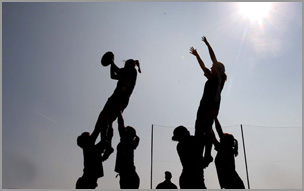Promising future for Middle Eastern teams
By John Birch
Published by Alison Donnelly, January 13, 2011
4 minute read

The end of 2010 also meant the end for one of the pioneers of womens international 7s rugby.
The Arabian Gulf RFU which has been the governing body for rugby in Bahrain, Qatar, Kuwait, Oman, Saudi Arabia and the United Arab Emirates since 1974 ceased to exist at the end of December as part of an IRBs plan to move responsibility for the game to new unions which will represent each of the countries that AGRFU are currently responsible for.
Although they have never played a test match, the Arabian Gulfs womens team - despite having fewer than 200 registered adult players - had been one of the most active sevens teams in the world. They were one of the 12 teams that took part in the first ever womens international sevens (at Hong Kong in 1997), since when the have played at least 76 internationals significantly more than England or European champions Spain, and as many as Australia and New Zealand put together!
Though they have never reached a tournament final, Gulf teams have at times been close. Only a pool defeat to Hong Kong prevented them reaching the final of the first Asian Sevens in 2003 in a campaign that saw them beat China 22-0, and in 2009 they were Plate winners beating Hong Kong on the way. They also finished third in the CAR North Sevens in Tunisia in 2007.
At the Hong Kong sevens where the Gulf have played ten times (only the hosts and Thailand have played there more) it has been rather tougher, but they picked up the Bowl in 2002 and the Shield in 2003, and in their final tournament this year reached the Plate semi-finals, losing out to Thailand.
So where now for the women of the Arabian Gulf? Most are based in the UAE who were first out of the blocks with a new Union (the UAERA) so for players based in Doha, Dubai, Abu Dubai and Shajah (where seven of the eight teams playing in the Gulf womens league are based) the future looks good. A new shirt, a new flag but beyond that no real change and early statements from the UAERA and IRB suggest that the new UAE team will take the place of the Arabian Gulf at this years Hong Kong Sevens.
But for the players based in Kuwait and the rest of the gulf opportunities to return to Hong Kong or the Asian Sevens in 2011 may be limited.
Kuwait at least have a team in the Gulf league (though how competitive a single club side would be on the international stage is open to question), but for women based in Bahrain, Qatar or any of the other current member of the Gulf union, the break up is a major gamble.
The promised extra funding and coaching resources may expand the game and produce more players in the long term, but in the meanwhile they may find that they have no-one to play for.
However, that is all in the future. For now its time to celebrate the achievements of a small band of pioneering rugby enthusiasts who have, for the past 13 years, been taking on the world.